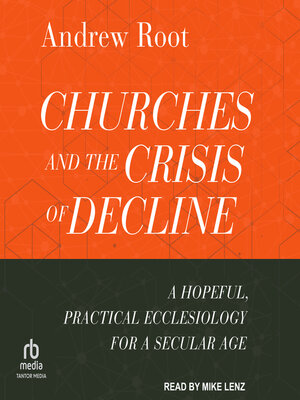Churches and the Crisis of Decline
audiobook (Unabridged) ∣ A Hopeful, Practical Ecclesiology for a Secular Age · Ministry in a Secular Age
By Andrew Root

Sign up to save your library
With an OverDrive account, you can save your favorite libraries for at-a-glance information about availability. Find out more about OverDrive accounts.
Find this title in Libby, the library reading app by OverDrive.



Search for a digital library with this title
Title found at these libraries:
| Library Name | Distance |
|---|---|
| Loading... |
Congregations often seek to combat the crisis of decline by using innovation to produce new resources. But leading practical theologian Andrew Root shows that the church's crisis is not in the loss of resources; it's in the loss of life—and that life can only return when we remain open to God's encountering presence.
This new book, related to Root's critically acclaimed Ministry in a Secular Age project, addresses the practical form the church must take in a secular age. Root uses two stories to frame the book: one about a church whose building becomes a pub and the other about Karl Barth. Root argues that Barth should be understood as a pastor with a deep practical theology that can help church leaders today.
This book pushes the church to be a waiting community that recognizes that the only way for it to find life is to stop seeing the church as the star of its own story. Instead of resisting decline, congregations must remain open to divine action. Root offers a rich vision for the church's future that moves away from an obsession with relevance and resources and toward the living God.
This new book, related to Root's critically acclaimed Ministry in a Secular Age project, addresses the practical form the church must take in a secular age. Root uses two stories to frame the book: one about a church whose building becomes a pub and the other about Karl Barth. Root argues that Barth should be understood as a pastor with a deep practical theology that can help church leaders today.
This book pushes the church to be a waiting community that recognizes that the only way for it to find life is to stop seeing the church as the star of its own story. Instead of resisting decline, congregations must remain open to divine action. Root offers a rich vision for the church's future that moves away from an obsession with relevance and resources and toward the living God.







